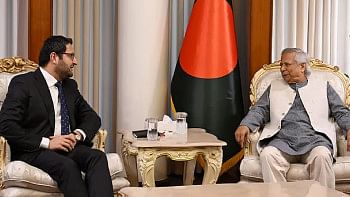Train workers before they go abroad: analysts

Bangladesh's migrant workers toil in foreign lands for longer hours compared to peers from other countries, but they earn much less as they lack skills and face a language barrier.
Experts yesterday called upon the government to equip aspirant migrant workers with the right set of skills and languages before they depart for jobs, so they can earn more and avoid exploitation.
Syed Manzur Elahi, a former adviser to the caretaker government, said skilled workers can remit more.
For example, Filipino migrant workers send home four times more in remittance compared to Bangladeshi workers, said the founder of Apex Group.
“But we are stuck in the unskilled segment of the labour market.”
Planning Minister AHM Mustafa Kamal, however, said skills are not a problem for the migrant workers. “Many Bangladeshis, who went to Saudi Arabia a few decades ago, now own shops and markets there. Our main problem lies in language proficiency.”
Sri Lankan workers earn up to 70 percent more than their Bangladeshi counterparts because of their fluency in English, he said, speaking at a dialogue -- Safeguarding Interests of Bangladesh Migrant Workers: Issues of Financial Inclusion and Social Protection -- at Lakeshore Hotel in Dhaka.
The expatriates' welfare and overseas employment ministry, the Centre for Policy Dialogue and the International Labour Organisation jointly organised the programme with support from the Swiss Agency for Development and Cooperation.
About 9.5 million people have gone abroad to 157 destinations, with an estimated 5 million still holding jobs abroad, said Prof Mustafizur Rahman, executive director of CPD, in his presentation.
Over the years, remittance has turned out to be a key driver of the economy.
Money sent home by migrant workers was $15.3 billion in 2014-15, which was $0.7 billion in 1990, $1.9 billion in 2000 and $3.8 billion in 2005.
Bangladesh is a major supplier of predominantly low skilled and unskilled workers, making up about 46.2 percent of the workforce, mostly concentrated in the Gulf countries, said Rahman.
He said 87 percent of the migrants did not receive any training prior to their departure.
As many of the host countries start to experience demographic shifts, the structure of their labour demand is expected to undergo important changes, he added.
“This has important implications for the development of needed skills and catering to the emerging demand for financial inclusion.”
The economist said there is no comprehensive policy for social security and protection for migrant workers; besides, no bilateral social security schemes have been signed with host countries.
MA Mannan, state minister for finance and planning, said agent banking can help in a great way in bringing remittance in a cost-effective way.
“Technology can defeat the middlemen.”
Nurul Islam, minister for expatriates' welfare and overseas employment, said Probashi Kallyan Bank will be turned into a scheduled bank so it can offer full-fledged financial services to migrant workers.
Zahid Hussain, lead economist of the World Bank in Dhaka, said migration issues are increasingly becoming important in economics as it gives jobs to workers.
He, however, painted a bleak picture of the migration scenario, citing a World Bank-Brac study that was conducted in 2014 among 3,054 migrant households and 3,122 prospective migrant workers.
It showed that the cost of a failed attempt to migrate averaged $392, while only 17 percent had formal job contracts.
Their wages per hour was Tk 110 against an expectation of Tk 125, meaning they toiled for long hours but got low wages, said Hussain.
Although middlemen are riskiest channel for migration, people still turn to them as they provide faster migration, the economist added.
Srinivas B Reddy, country director of ILO, said it is opportune that issues of employment, decent work, social protection and remittance are well covered in the Sustainable Development Goals and migrant workers are recognised as a specific category facing vulnerabilities.
“Now it is time for the workers, employers and the government to collaborate and live up to this commitment they made [in the UN] in September this year.”
The cost of remittance transfers needs to go down in all corridors, he said.
Beate K Elsaesser, deputy head of mission of the embassy of Switzerland in Dhaka, said the issue of migration is now more focused in the 7th five-year plan of Bangladesh.
“It has been identified as a driver for growth and poverty reduction, and as a potential factor to boost the economic development of those regions of Bangladesh that are lagging-behind.”
Salahuddin Kasem Khan, president of Bangladesh Employers' Federation, called for accelerating vocational education at SSC and HSC levels and collaborating with worker-receiving countries so they can be trained according to their specifications.
Muhammed Nurul Amin, managing director of Meghna Bank Ltd, said banks would be happy to train workers without any cost.
Khandaker Md Iftekhar Haider, secretary of the ministry of expatriates' welfare and overseas employment, Sheepa Hafiza, director of migration programme of Brac, and Zakir Hussain, a deputy managing director of Mutural Trust Bank, also spoke.

 For all latest news, follow The Daily Star's Google News channel.
For all latest news, follow The Daily Star's Google News channel. 



Comments